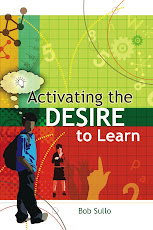When
discussing brain-based learning, In Chapter 2 of The Inspiring Teacher, I say, “Because new
principles and applications are being generated so rapidly, I encourage readers
to become familiar with current literature about learning and the brain.”
Here’s
an example: I came across a March 7, 2013 article entitled “4 Ways to use exercise to increase brain power.” Based on 19 studies involving 586 kids, teenagers,
and young adults, the report was published in the prestigious British
Medical Journal
and found “10 to 40
minutes bursts of exercise led to an immediate boost in concentration and
mental focus, likely by improving blood flow to the brain.”
According
to Harvard psychiatrist and author John Ratey, one way classroom teachers can
use these findings to optimize student performance on a test is to have the
kids jump rope, run in place, or do squat bends, quickly improving blood flow
to the brain and speeding the transmission of signals through the nerve cells.
If you give a test within an hour of the exercise, scores should improve.
How
often do educators and parents complain that kids lack mental focus? That they
don’t concentrate? It turns out we may not need to label so many kids as ADD or
ADHD and resort to chemical intervention. And we don’t have to accept poor
concentration and poor performance as immutable realities. A better
understanding of how the brain works and a few simple classroom strategies can
significantly enhance focus and concentration, resulting in increased learning
and better performance on tests. Applying what we know about brain-based
learning is one quality of inspiring teachers. I encourage you to incorporate
this simple strategy.
***
As
always, if you enjoyed this and found it useful, please send the link to your
friends. Thanks.
Bob
Sullo
For
information about books by Bob Sullo and to schedule a keynote, workshop, or
series for your school, agency, or parent group visit www.internalmotivation.net
Don't forget to get your copy of the revised
edition of The Inspiring Teacher: Making A Positive Difference In Students' Lives.






Thanks for sharing your views.
ReplyDeleteA have attended some motivational programs in Luckow which is organized by Confidence Multiple Academy and the host person & speaker is Sameer Shaikh, Who's a motivational speaker, leadership consultant & business coach in Lucknow.